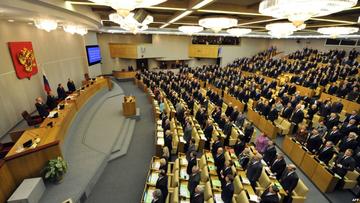
Legislative changes introduced by the anti-terrorism bill approved by the Russian Duma on 24 June will bring severe restrictions on freedom of expression, freedom of thought and the right to privacy
The so-called "Yarovaya law" was named after the MP who drafted it, Irina Yarovaya, of the United Russia party. To become law, it now needs to be approved by the Federation Council and to be signed by Russian President Vladimir Putin, but it seems that this process will be fast and smooth.
If this happens, as early as 20 July, Russian citizens may be required to inform the authorities about everything they know on the preparations of terrorist attacks, armed rebellions, and many other types of crimes. Those who fail to do so will face up to a year in jail.
The legislation also obliges telephony and internet providers to increase the storage time of metadata for contents exchanged online, as well as to collaborate with authorities in the decoding of encrypted messaging services like WhatsApp, Telegram or Viber.
With the "Yarovaya law", a new crime will also be introduced - which implies sentences from 5 to a maximum of 10 years in prison - for those who "organise or encourage people to take part in mass disorders". A rule that will limit any possible protest by the opposition.
It will also prohibit proselytising, preaching, praying, or the spread of religious material outside of "specially designated places", i.e. the places of worship of officially recognised religious institutions.
Many human rights organisations, such as Human Rights Watch , have expressed their criticism regarding this law, denouncing the risks it poses to the individual freedoms of citizens.
Edward Snowden, responsible for the 2013 Datagate on the global surveillance implemented by the US government and who currently resides in Russia, has tweeted that this law is a new "Big Brother" for Russia and "an unworkable and unjustifiable violation of rights that should never be signed". Other tweets continued stating that "Store 6 months of content [of web communications] is not just dangerous, it's impractical; mass surveillance does not work."
Russia's new Big Brother law is an unworkable, unjustifiable violation of rights that should never be signed. https://t.co/HNsYmRaxR3
— Edward Snowden (@Snowden) 25 giugno 2016
Questa pubblicazione è stata prodotta nell'ambito del progetto European Centre for Press and Media Freedom, cofinanziato dalla Commissione europea. La responsabilità sui contenuti di questa pubblicazione è di Osservatorio Balcani e Caucaso e non riflette in alcun modo l'opinione dell'Unione Europea. Vai alla pagina del progetto

 Russia: the risks of the anti-terrorism law
Russia: the risks of the anti-terrorism law




 Tutti i contenuti disponibili sul sito di Osservatorio Balcani e Caucaso sono distribuiti con licenza
Tutti i contenuti disponibili sul sito di Osservatorio Balcani e Caucaso sono distribuiti con licenza 